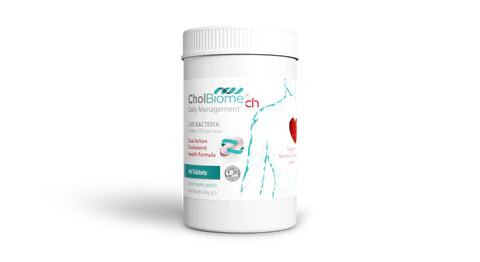
ProBiotix Health launches new dual-action cholesterol reducing bi-layer tablet CholBiome®CH at Vitafoods Europe
ProBiotix Health plc (‘ProBiotix’), a global market leader in microbiome modulation technology in the life sciences industry, has added to its growing range of science-backed cholesterol-reducing products with CholBiome®CH.
The latest innovation from ProBiotix, which will launch at Vitafoods Europe this year, is a result of new regulations from the European Food Safety Authority (EFSA) that came into effect last June, whereby EFSA ruled that Monacolin K, an ingredient which was known to maintain normal cholesterol levels in the blood, was no longer able to make its health claim regarding cholesterol.
In addition, the governing body set a new daily limit of less than 3mg of content for any food or supplement that contained Monocolin K, with a warning required to consumers to avoid consumption if they were lactating, below 18 years old or above the age of 70, and already taking cholesterol-lowering drugs1,2.
To support food brands, retailers and consumers in making the switch from Monacolin K to another alternative solution, CholBiome®CH. contains two active ingredients in a bi-layer tablet – the company’s patented probiotic backed by multiple independent studies, Lactobacillus plantarum LPLDL®, and Plant Sterols / Stanols (PSS). These combine synergistically to support the reduction of both internal and dietary cholesterol levels via its dual action cholesterol reducing formula.
Steen Andersen, CEO at ProBiotix, commented: “With one in six deaths globally caused by coronary heart disease and up to 4.4 million deaths recorded globally due to high LDL cholesterol in 20193, it is vital that the life sciences industry responds with natural innovations that can support a healthy heart. Since the pandemic, consumers are actively seeking natural supplements that take preventative action and reduce the risk of cardiovascular disease (CVD) risk. Those that do so by reducing LDL cholesterol levels safely, effectively and through evidence-backed research are exactly what consumers are looking for.
“For many years, ProBiotix Health has been helping to tackle high cholesterol and blood pressure with our CholBiome® range, which includes CholBiome®X3, CholBiome®BP and CholBiome®VH. We are proud to announce that CholBiome®CH extends our range of uniquely formulated heart health food supplements.”
This new allergen and GMO-free innovation delivers a dual mechanism of action, where the award-winning ingredient LPLDL acts on the internal cholesterol to produce enzymes that break down bile salts. This encourages the liver to remove cholesterol from the blood to replenish required levels and maintain the body’s bile salt pool. Through the secondary action, PSS reduces dietary cholesterol absorption and promotes excretion.
Due to the inclusion of PSS, CholBiome®CH can claim to contribute to the maintenance of normal blood cholesterol levels, as backed by EFSA4.
“High levels of cholesterol have been commonly tackled by approaches that come with multiple undesirable side effects,” continued Andersen. “Yet LPLDL offers a scientific, side-effect free alternative to improve cardiovascular health. The naturally occurring probiotic strain has demonstrated its efficacy in several human studies showing that it can effectively lower total cholesterol and ‘bad’ LDL cholesterol, while increasing ‘good’ HDL cholesterol. As a leader in the microbiome modulation area, consumers and those in the industry can rest assured that we continuously expand the clinical studies supporting the efficacy of CholBiome and LPLDL.”
Designed to be taken twice daily after main meals, CholBiome®CH will be available for consumers to purchase on the optibiotix.online store.
For more information on CholBiome®CH or the CholBiome® range, please visit: https://lpldl.com/cholbiome-series/
References:
1. Sandwalk Bioventures, June 2022 https://www.sandwalkbio.com/post/monacolins-restrictions-coming-up-in-europe
2. Publications Office (europa.eu)
3. British Heart Foundation, February 2023
4. EFSA Journal 2010;8(10):1813
